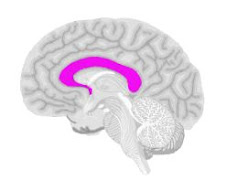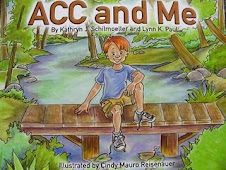 Abbie and her dog, Scout.
Abbie and her dog, Scout.
Abbie's Story:
When did you find out that you have partial ACC? How old?"I think I was probably told about it when my parents found out,
which was through an MRI when I was about 2. The doctors were
actually looking for something more life threatening when they
found it, so they didn't take much notice or act on it. I didn't
really start to feel any different from others or notice until
I was about 8 or 9. I was also diagnosed with congenital
panhypopituitarism and absence of pituitary gland."
What did you struggle with in school?"Being a shy one and not looked up to or noticed much by other
students, not knowing what to say when other girls did talk to
me did not help this. The fact that the teachers and students
thought I looked fine and coped so well, so they didn’t always
believe I needed extra help and understanding."
What did you enjoy most and do well at in school?"I was always very organized, otherwise I was not able to keep
up and got anxious and stressed. I was always waiting for a big
load to come that I would struggle to keep up with, but it never
did because I worked really hard, maybe a little too hard and
managed to keep up more then some of the other students. And I
completed my VCE (Victorian Certificate of Education), which I
did’nt think I would be able to do many time during my years at
school, because it was hard."
VCE is the certificate awarded to secondary students who complete
high school studies Year 11 and 12 or equivalent in Victoria, Australia.
Did you struggle with social skills in school?"In primary school I don’t remember struggling much. Since I moved
to the city from a small community and started high school, I have
never had the same kind of friendship/s I had in primary school. I
feel anxious and awkward all the time when having to talk to people,
I sit for a long time without saying anything because I can’t think
of what to say to match the situation, I get exhausted after spending
time with any friends. I have a couple of anallergies that may help
people with a DCC out there.
1. Socialising for me is like standing on the side of a wide,
busy road with cars going both ways. You have to get across the road
with no traffic lights, then when you finally get to the other side,
you have to turn around and cross back over the road again. Do this
over and over a few times and you will discover it is physically and
mentally exhausting. This is what socializing feels like for me.
2. When you feel exhausted from being with people and socializing,
or crossing the busy road over and over again, your body and your
brain becomes like a torch with a flat battery. It still has a
little light left and can put on an act and work a little bit,
but eventually the light goes out and it can’t work any more.
An ACCer’s or DCCer’s brain cannot work as fast and as long as
a person with normal brain connection, because they have to work
twice as hard to keep up with everything, therefore, we get tired
quicker and things become harder then they may really be.
Depending on how much work my torch has had to do is how much
I can put into socializing and how how normal I can act. More
often then not, this is not very much. I hope this makes sense
to people, it was a bit hard to explain."
Did you make friends easily in school?"Not at high school. I had a couple of friends but talking and doing
things together was always very awkward and hard to organize. Our
families and upbringings were very different and I had nothing in
common with them. I never had the courage or the no how to mix
with others and make other friends, so I stayed with the 2 I had
and in the end did not continue contact with them. I am still on
the search for how to make friends and who to make friends with,
but in 7 years, now at Uni in adult education, I still feel I am
not getting anywhere. I have a couple of friends who I hang out
with one at a time, but am not really connecting with them and
often don’t enjoy spending time with them because it is too
awkward. They also have their own issues with how to socialize."
Do you still struggle today with social skills as an adult?"Yes. I am not really sure what else I can say without repeating
myself. I could go on forever but it might get confusing, because
I am confused about the whole issue myself."
Did you attend a mainstream classroom?Yes. All my schooling was mainstream. I repeated my last year of
primary school (grade.6) because I wasn’t ready emotionally to go
into high school yet."
Did you receive Special Ed resource help?"I did receive some extra assistance in primary school when I got to
grade 5 or 6 and still could’nt tell the time or count money. I had a
modified subject load in the last 2 years of high school, was in
classes where the teacher gave extra assistance, had extra free
study periods where I went to receive one on one help from special
needs teachers and was granted one on one tutoring during my last
year of secondary school for exams and big loads of work. When I
was away from school I received a modified load of work to catch
up on when I returned and restrictions on how much time I was to
spend, otherwise I never stopped working."
Can you ride a bike and drive a car?"I have a bike I bought 6 years ago but have only ridden about twice
because I can’t navigate small spaces and people. I do not and
probably will not drive"
.
Did you attend college? Did you get a degree?"I have just started my first proper course of study of certificate IV
Liberal Arts, after finishing year 12 in 2009, I needed a brake year to
fill in some gaps to find some interests, socialize a bit more and
improve my life skills. I did a certificate I course of transitioning
from high school to other options in life, and am choosing to continue
my study for as long as I can."
What specific life skills are challenging for you?The basic every day life skills I am working to improve are simple
things like getting anywhere on my own on public transport, as I
won't be able to drive for a while yet, if ever. I am aiming to
eventually use public transport as if it were my car (though it
will always takes a lot longer then driving) I also need to improve
my verbal communication skills- being myself and not being affraid
of my difficulties, being less awkward when talking to people and
the biggest thing of all, taking things as they come in a conversation
and not worrying so much about what I can say next. I am also on
the search for an interest and something I can do for enjoyement,
because everything I am doing at the moment is things I HAVE to do
like studying, appointments and jobs at home. I need something else
to do with my time that is regular and fun."
Do you have a job and if so what do you do?"No job. Focusing on study."
Are you married? Single?"Single. Never been in a relationship. Would like a close guy friend to
hang out with and be comfortable with talking to, but not ready for
anything more."
Do you have children?"No"
How does ACC affect you today as an adult?"Socially, stressing too much about things most people don’t worry
about, feeling nieve for my age, feeling too dependant on others,
being behind in life experiences. Not being a relaxed person."
What do you enjoy doing the most in life? "Watching movies. Watching a movie screen, though not good to do
too much is good. It takes away tension when being with someone
else because you don’t have to talk. It is relaxing and fun. It
means you don’t have to think about anything for a couple of hours."
What are you passionate about?"Finding a friend or a group of friends I can keep who I want to be
with. Finding something am interested in and enjoy doing that I can
stick to and be productive with."
Abbie, P-ACC, 20 years old, Australia.
It is an absolute privilege to be able to include Abbie's story
here for you to read.
Thank you very much, Abbie. It was a pleasure to exchange
e-mails with you and get to know you a little better. I
appreciate your openness, your honesty, the way you let me
know your thoughts and how you expressed yourself. I
enjoyed communicating with you.
It is my hope for you, Abbie, that you will see all of the
beautiful things about yourself and your abilities because
you are an amazing person who has already accomplished big
goals.
Be your very own sweet, unique self and believe in all of
the possibilities. I know and believe with all my heart
that you WILL discover an interest that you are passionate
about and it will be soothing, relaxing and lots of fun.
If you want to leave a comment for Abbie I am
sure she would appreciate it.If you are an adult who has ACC or a corpus callosum
disorder, do you want to
share your story? I would love to hear from you. Please send me an
e-mail























